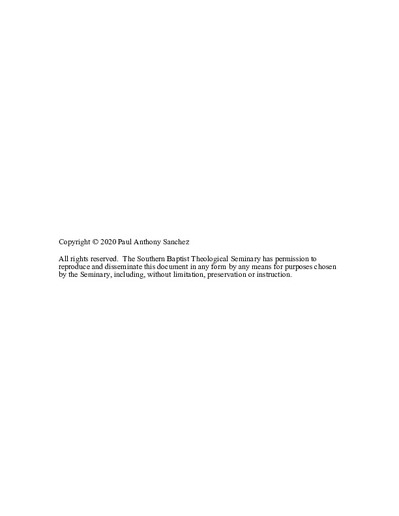| dc.contributor.advisor | Wills, Gregory A. | |
| dc.contributor.author | Sanchez, Paul Anthony | |
| dc.date.accessioned | 2020-05-13T19:13:40Z | |
| dc.date.available | 2020-05-13T19:13:40Z | |
| dc.date.issued | 2020-05 | |
| dc.identifier.uri | https://hdl.handle.net/10392/6085 | |
| dc.description | Ph.D., The Southern Baptist Theological Seminary, 2020 | en_US |
| dc.description.abstract | William Louis Poteat played a leading role in spreading liberalism among Baptists in North Carolina and the South. He promoted a liberal vision for Christianity in an attempt to appeal to the cultured elites of the New South. As a leading religious figure and respected public intellectual he aimed to harmonize Christianity with modern notions of authority, and modern values and sentiments, to provide a religion that suited the cosmopolitan image that the professional class of southerners aimed to cultivate for themselves. Poteat became a symbol for liberal religion in the South and helped secure space for Southern Baptist liberals to expand their influence for generations to come. Like theological liberals in the North, Poteat and other liberals in the South reconceptualized Christianity to fit with the higher revelations of modern science and the progressive spirit of the age. His journey to liberalism began by adapting Christianity to fit with Darwinism, which required a new theology of revelation. To make Christianity safe from modern skeptics, he embraced an alternative religious epistemology of religious experience that also created a safe distance from the traditional doctrinal Christianity that he believed to be unbearably outdated. A mission of social redemption replaced the otherworldly hope of traditional Christianity, through which Poteat hoped also to supply fresh relevance for religion in an age that seemed likely to neglect it. He was the most influential Baptist liberal in the South in the first third of the twentieth century and he influenced generations of Baptist leaders who embraced liberal Christianity as a respectable religion for the new southern bourgeoisie. Although he faced seasons of fierce opposition for his views, Poteat proved that an outspoken liberal could thrive in the highest places of Southern Baptist leadership, to the resounding praise of liberals across the South. | en_US |
| dc.subject.lcsh | Poteat, William Louis, 1856-1938 | en-us |
| dc.subject.lcsh | Liberalism (Religion)--Southern States--History | en-us |
| dc.title | Christianity at the Crossroads: William Louis Poteat and Liberal Religion in the Baptist South | en_US |
| dc.type | Electronic dissertation | en_US |
| dc.type | Text | |
| dc.contributor.committee | Wilsey, John D. | |
| dc.contributor.committee | Wellum, Stephen J. | |
| dc.type.qualificationname | Ph.D. | en_US |
| dc.publisher.institution | Southern Baptist Theological Seminary | en_US |
| dc.publisher.department | School of Theology | |

